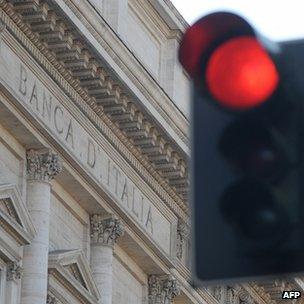Italy's moment of truth
- Published
- comments

Italy has reached a moment of truth.
The 7.89% interest the Italian government had to pay this morning to borrow 3.5bn euros for three years, and the 7.56% interest that investors demanded when lending to Italy for 10 years: well, those rates would be completely unaffordable if applied to all 1.9tn euros of its public-sector debts.
So the make-or-break question - for Italy and for the eurozone - is whether there is the faintest chance those rates will fall, without the supply of emergency finance to a highly indebted government that's presiding over a very slow-growing economy.
The precedent of Greece, Portugal and Ireland suggests there is little prospect of Italy's borrowing costs returning to non-penal levels without outside help, even if its government of technocrats produces a credible programme both to reduce the mountain of debt and put some fuel in the economy.
Here's the nightmare: the source of rescue finance is hard to find.
The eurozone's official bailout fund, the European Financial Stability Facility, has not yet been turned into the promised big bazooka, with enough financial capacity to cover the 400bn euros that Italy will need next year to refinance maturing debt, finance the deficit and pay interest.
Right now, the EFSF has enough in the kitty to keep Italy afloat for a bit more than six months.
As for the International Monetary Fund, China and the US are not keen for it to fill the breach, because they see Italy as a European problem requiring a European solution.
The other potential lender of last resort is the European Central Bank, but it is as reluctant as ever to lend substantially to a eurozone government.
All of which means that tonight's meeting of eurozone finance ministers is of critical importance. But if this were an episode of Star Trek, they might well be in the engine room shouting, "I dinnae have the power, Captain".
PS David Riley, the Head of Sovereign Ratings at Fitch, has just told Stephanie Flanders that "investors are now starting to question the entire viability of the eurosystem".